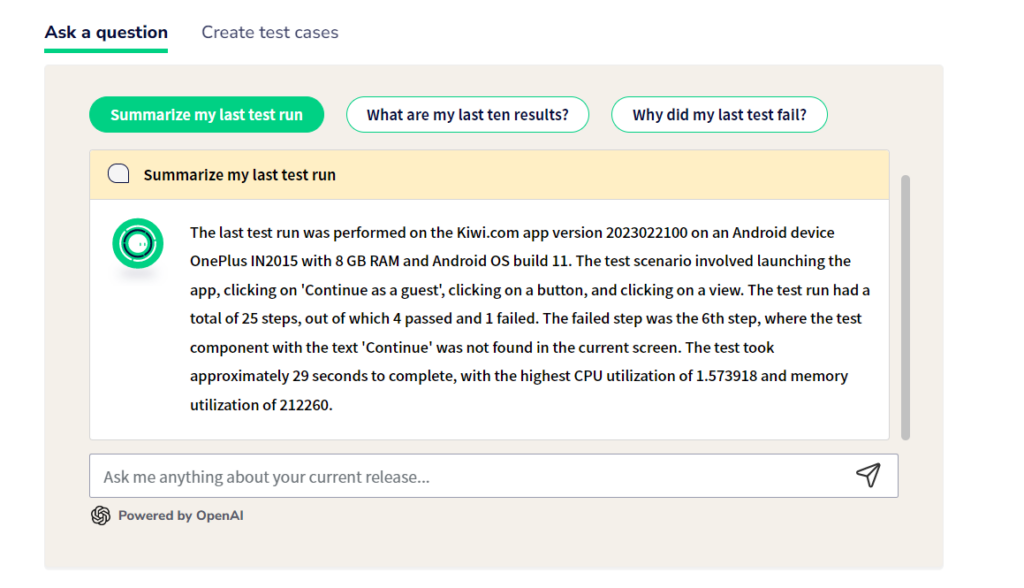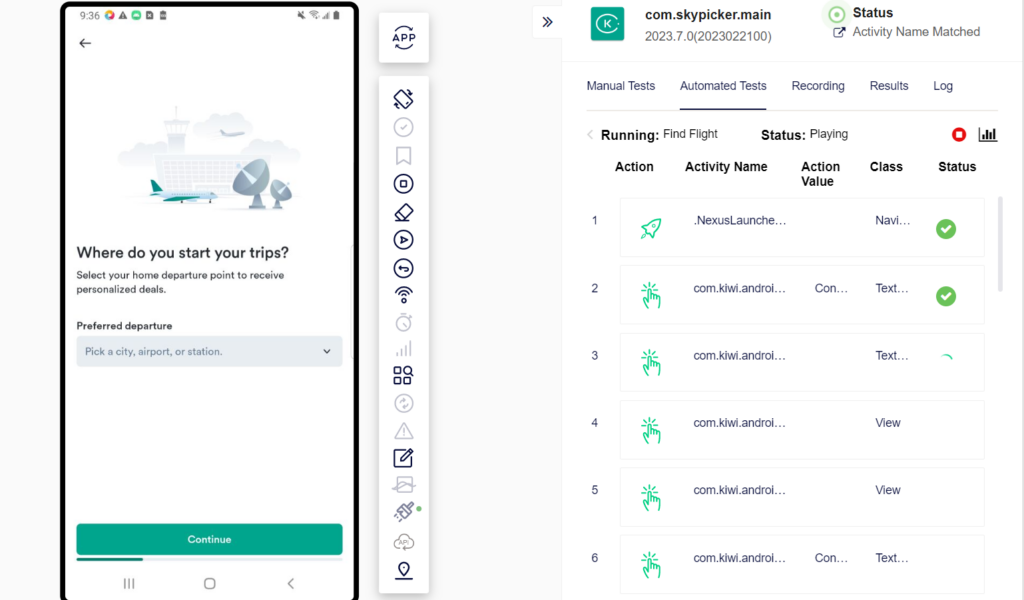Is AI mobile app testing the future?
Businesses are making better decisions, developers are writing code faster, and operations are finally automating their processes. Almost every area of business seems to be expediting time-to-value with Artificial Intelligence. As Unite.AI puts it:
The increasingly close “partnership” between humans and artificial intelligence will call forth a paradigm shift in which their roles will complement each other without overlapping directly. The next major milestone is that devs will have more of a supervisory function. AI, in turn, will do the bulk of the tedious work so that people’s contribution is restricted to putting the finishing touches on the process.
Now, AI app testing has come to transform quality assurance. Let’s take a look!
A continually abstracted experience
As the workforce evolves, teams need to be agile and shift-left. That’s why SaaS providers are continuing to abstract their tools: They’re providing a better, more intuitive user experience for their customers. It’s more important that organizations do more with less. That is, less resources and less time, and all in a less forgiving market.
The pandemic, coupled with a looming recession has reinforced the need for new, agile ways to deliver software. Just consider what’s happened over the last few years with the No-Code Revolution. From back-end to front-end, you can create robust applications without custom code or complex integrations.
Major developments
This article from TechRepublic, puts recent developments succinctly:
AI and ML tools will fundamentally alter the ways in which applications are built – from design-to-code platforms and tools, to ML models that automatically generate code, to models that automate elements of application testing.
Abstraction has always existed on a continuum. From binary machine code, to frameworks and libraries, to no-code at all. The envelope keeps getting pushed further and further.
Now, AI is the latest frontier, and organizations of all types are including it in their product offering. Consider these examples:
- Slack is using natural language processing to help users intuitively search information. Slack also uses machine learning to provide recommendations for channels, people, and files that users may be interested in.
- Dropbox uses AI to provide better content recommendations based on user activity and interests.
- Salesforce leverages Einstein to offer customers predictive analytics, natural language processing, and machine learning capabilities to personalize marketing campaigns, prioritize leads, and improve customer service.
- HubSpot’s Sales Hub provides predictive lead scoring, email prioritization, and sales forecasting.
- Zoom is using AI to remove background noise, automatically adjust lighting, and enhance video quality as well as provide live transcription and translation services.
- Shopify gives product recommendations to shoppers based on their behavior and interests. It also uses AI to optimize pricing and inventory management.
In DevOps, AI has found a wide range of use cases, as we discussed recently:
The rapidly evolving technology has made its way into countless verticals, including mobile app development. AI is already changing the game for DevOps teams worldwide by enabling them to design and test mobile apps with unmatched efficiency. If your team has been looking for a better way to build and test its mobile apps, implementing AI technology into the DevOps workflow may be the answer.
AI and Mobile App Testing
We’re seeing AI do impressive things in every vertical, including mobile app testing. Together, AI and machine learning are making testing more accurate, and smarter. As GlobalOwls says:
Traditionally, quality control and assurance take time and effort on the part of the developers. Sometimes errors can slip through this process. Therefore, when an application is released, that’s only the time bugs get noticed.
Traditionally, quality control and assurance take time and effort on the part of the developers. Sometimes errors can slip through this process. Therefore, when an application is released, that’s only the time bugs get noticed.
Artificial Intelligence and machine learning have found plenty of practical applications in the QA, including:
- Test Automation: AI-powered testing tools can automate the entire testing process, including test case creation, execution, and reporting.
- Increase Test Coverage: AI-based tools can analyze the app’s code and identify potential areas of weakness or errors that can cause a crash or error.
- Improved Accuracy: AI-powered testing tools use machine learning algorithms to analyze and understand the app’s behavior, so they can detect bugs and issues that may be missed by human testers.
- Predictive Analytics: find out where you’ll run into issues, before they occur. AI-powered testing tools can analyze user behavior and provide predictive analytics that can help developers identify potential issues.
Sofy + Generative AI = Sofy Co-Pilot
Sofy recently launched Sofy Co-Pilot, enhancing the Sofy platform with OpenAI’s generative AI capabilities. This was built to further streamline your testing strategy by identifying patterns, trends, and analyzing test results while removing pain points from your day-to-day testing process. As Syed Hamid, Sofy CEO & Founder, puts it, “With Sofy Co-Pilot, we’ve enabled AI technology in a useful way, helping testers author and execute tests in seconds.”
But what exactly does it do? Sofy empowers testers to leverage a chat-based assistant built on OpenAI’s ChatGPT that responds to natural language. With Sofy Co-Pilot, you can stay focused on the testing strategy while AI helps you with the tedious and research-intensive areas of troubleshooting:
- Quickly identify test coverage gaps and debug test failures
- Get insights on test performance and test case health
- Highlight device coverage and QA progress
Don’t want to recreate test steps? Just provide SofyBot with a link to your documentation and watch Sofy create manual testing steps for you. Then, automate your manual tests with a click and test across multiple live devices.
You can also use Co-Pilot like a personal assistant, asking questions while you test. Such as:
- What are some recent test results?
- Share insights from device metrics
- Why did my test fail?
- Summarize my last test run
Or ask general testing best practice questions:
- What is load testing?
- What are common test cases for restaurant apps?
- How many devices should I test on?

All-in-one
For the last few years, Sofy has been transforming the way mobile testing is done. Sofy’s no-code platform empowers testers to create test cases by recording manual test steps on real, cloud-hosted devices. With Sofy, you can acquire a clean instance of a real device with your app already installed. Then, simply record a manual test, automate, and run across different devices. Sofy provides:
- Hyper-intelligent regression testing: Sofy’s advanced algorithms automatically analyze code changes, to identify impacted test cases.
- Reusability and composability: Build templates and reuse test cases. Sofy makes it easier to reuse test cases, create templates, and build new tests.
- Integration with CI/CD pipeline: You can integrate Sofy with your favorite CI/CD tool so that you can automatically run your test cases when changes are made.
- Reporting made easy: Sofy creates and reports found issues in detailed logs, providing screenshots and steps to replicate. Sofy can even report issues directly to your project management tools.

Into the future
AI has come to revolutionize testing and Sofy is ready for the change. We’re all well on our way to an easier, faster, and more efficient app testing world! If you’d like to learn more about how AI can improve your mobile app testing experience download our free guide.
Disclaimer: The views and opinions expressed above are those of the contributor and do not necessarily represent or reflect the official beliefs or positions of Sofy.









